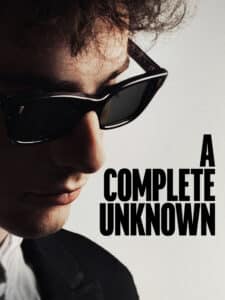
A Complete Unknown
1961. At the bedside of Woody Guthrie, a dying folk singer, a young man from Minnesota, Robert Zimmerman, shows up, calling himself Bob Dylan. Woody and his friend Pete Seeger hear him play and realize they are dealing with a rare talent. Dylan quickly makes his way into the New York scene of Greenwich Village and becomes a folk artist revered for his ability to combine innate musicality with protest themes that reject the establishment. He becomes romantically involved with Sylvie Russo, but cheats on her with Joan Baez, another talented figure on the folk scene. This ends in 1965, the year of his “electric” turn, when Dylan plays with a rock band and abandons his politically charged lyrics in favor of a surreal lyricism somewhere between Rimbaud and Dylan Thomas. The Greenwich Village community considers him a traitor, but the world is now at his feet.
Solving the Bob Dylan enigma, between truth and lies, myth and idolatry, clearly remains an impossible task. So it’s better to accept the Dylanian narrative as it is and work with the perception of Dylan, that of audiences in the early 1960s and of us, viewers of the third millennium. In this sense, Mangold’s approach is courageous: while not as radical as Todd Haynes’s treatment in I’m Not There—which broke Dylan down into multiple characters, played by actors of varying ages and ethnicities—it is at least careful enough to avoid the more traditional approach to biographical material.
Here, the burden falls squarely on Timothée Chalamet’s shoulders, and the focus is solely on a specific period of Dylan’s career: that of the ambitious folksinger who came from nowhere, with a suitcase full of songs and groundbreaking ideas. Aloof, arrogant, and inscrutable, Chalamet’s Dylan is a temperamental young man, impossible to logically associate with the author of “Masters of War” or “Like a Rolling Stone,” just like Dylan himself, who has always strived to conceal his identity in his compositions. As fans know well, and as he himself has implicitly confirmed, Dylan is his songs, in which he interprets the (counter)current thinking of protest or distances himself from it to escape the conformism of nonconformism and always prove himself one step ahead of the others.
Hence Mangold’s choice, atypical for a classic musical biopic, to prioritize, almost as if it were a musical, the sound element over the story, with Chalamet reinterpreting many songs from Dylan’s repertoire.
The more strictly biographical aspect of A Complete Unknown is consequently sacrificed in terms of temporal timing and forced to oversimplify and introduce some forced elements—for example, by short-circuiting the epilogue in Newport with the presence of Johnny Cash.
Edward Norton is extraordinary as Pete Seeger, the disillusioned mentor, who immediately realizes that Dylan will betray him like Judas and surpass him in talent, but can’t help but believe in him. The female characters’ characterizations are less fleshed out, with Monica Barbaro admirable in her Joan Baez-style vocal performances, but not as convincing in the Dylan/Chalamet dialogue scenes. Flaws and strains are perhaps inevitable in such a high-stakes project, but ultimately, the whole of A Complete Unknown is greater than the sum of its many parts.
To watch movies and TV shows online, please sign up with our partner, a legit streaming service.
Get Started ➔






